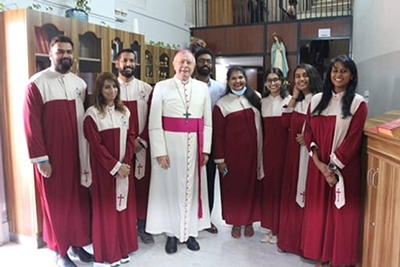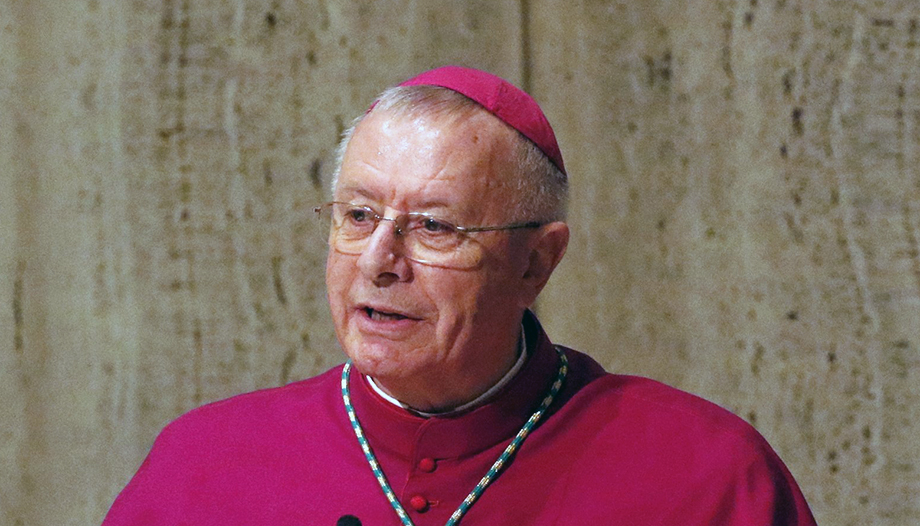Bahrain is a state with more than thirty islands, nestled in the blue Persian Gulf. Of the small kingdom ruled by a constitutional monarchy bordered by Saudi Arabia to the west and Qatar to the south and whose population is mostly Muslim, Monsignor Paul Hinder says it is a "nation that is proud to be a champion of religious tolerance and allows non-Muslims to practice their faith in their respective places of worship."
The bishop, administrator of the Apostolic Vicariate of North Arabia, under whose jurisdiction Bahrain falls, affirms that the trip that Pope Francis will make to the country from November 3 to 6 is "a great honor for everyone".
The Kingdom rolls out the red carpet for the Holy Father. While those in charge of the vicariate are working with the authorities to prepare a great program for the Pontiff, the community is working behind the scenes to ensure that everything goes smoothly."
So there will be a warm welcome....
-Yes. The authorities are preparing to give a warm welcome to the Holy Father. His Majesty King Hamad bin Isa Al Khalifa will hold a private meeting with the Pope immediately after his arrival at the royal palace in Sakhir on November 3.
The civil and ecclesiastical authorities are organizing a public mass at the national stadium on Saturday, November 5 at 8:30 a.m., to be attended by the Catholics of the Apostolic Vicariate of North Arabia and the inhabitants of the surrounding area.
The organizers of the "Bahrain Forum for Dialogue: East and West for Human Coexistence" are also preparing to give a worthy welcome to Pope Francis on Friday, November 4 at 10:00 am. Numerous leaders of different religions will also participate on that day at the Al-Fida Square of the Royal Palace in Sakhir.
What does this visit represent for the country?
-The Persian Gulf is predominantly Muslim, with varying degrees of religious freedom and tolerance. Bahrain prides itself on supporting and encouraging tolerance and coexistence. The Kingdom has supported non-Muslims in the practice of their worship for more than 200 years. The Pope's visit will further reinforce the small kingdom as a propagator of religious tolerance.
The dialogue forum, to be attended by the Pope and other prominent religious leaders, is an expression of the kingdom's commitment to interfaith harmony and peaceful coexistence.

Bahrain will win points in the international community as a defender of the rights of different faiths, as the Pontiff reiterates his call for peace and justice, without discrimination of religion or nationality.
Bahrain will distinguish itself as a country that respects all religions and promotes dialogue as a means to achieve peace and reconciliation between warring nations or factions.
This is a message that concerns all parts of the world, especially the Persian Gulf.
What is the situation of the Catholic Church in the country?
-There are an estimated 80,000 Catholics in Bahrain, many of them immigrants from Asia, especially the Philippines and India. In total, Christians, some 210,000 people, account for 14% of the population, followed by Hindus, with 10%.
There are two parishes here: the Church of the Sacred Heart - the first church in the Persian Gulf, built and inaugurated in 1939 - and the Cathedral of Our Lady of Arabia, built on a 9,000 square meter site donated by His Majesty King Hamad.
Church activities that could have an important impact on society are limited. There is the Sacred Heart School, which is held in high esteem among the citizens.
Support for the workers is carried out, discreetly, by parish groups that make visits to the labor camps (residential areas reserved for immigrant workers).
As migrants, Christians have no political influence on the country's legislation, but they can contribute in a discreet and prudent way to a greater awareness of specific social problems.
How is the Church preparing for the Pope's visit and what do you expect from it?
-For many Bahraini Catholics, who have been waiting for this visit since the king personally invited the Pope, it is a dream come true.
The news of the papal visit has aroused great enthusiasm, not only among Catholics but also among people of other denominations. In addition to the Mass, separate programs have been organized in which the Holy Father will meet with Catholic groups and organizations.
Church authorities are preparing an ecumenical meeting and a prayer for peace at the Cathedral of Our Lady of Arabia in Awali.
Another prayer meeting and Angelus with priests, consecrated persons, seminarians and pastoral workers is also being prepared at Sacred Heart Church in Manama. A choir of 100 people, made up of singers and musicians of different nationalities, began rehearsing to sing during the Holy Mass.
As Bahrain is part of the Apostolic Vicariate of North Arabia, the faithful from all over the region are organizing a trip to Bahrain to strengthen their faith and realize their dream of seeing the Pope in person and participating in Holy Mass.
The Pope's visit will take place on the occasion of the dialogue forum dedicated to human coexistence between East and West. What is the importance of dialogue in Bahrain? And what does it mean for the Church to be in a minority?
-This visit is a continuation of the Pontiff's dialogue with the Muslim world. One of the most pressing issues is the question of violence and the importance of the values of justice and peace.
There is the famous saying "there is no peace without justice": dialogue is the only way forward in a world where there is no possibility of using violence to secure one's own way, because this opens up the frightening possibility of the use of weapons of mass destruction that will end up targeting innocents on both sides.
By hosting this event, Bahrain is leading the way and trying to spread the message that resolving differences is only possible through dialogue: this, for the country, is crucial from the point of view of the divide between Shia and Sunni Muslims.
Moreover, by sponsoring the papal visit, Bahrain is sending a signal to various regional sectors: differences should be addressed through dialogue rather than confrontation.
As for the local Church, the papal visit will serve as a reminder that, regardless of where we are, we can practice our faith and be beacons of peace and justice, even in a predominantly non-Christian environment. The Pope's visit will help strengthen our resolve to live a truly Christian life.
During his visit, the Pope will visit the city of Awali, where the cathedral dedicated to Our Lady of Arabia, patroness of the Persian Gulf, was consecrated on December 10, 2021. Why, in your opinion, is this gesture important? How important was the construction of this cathedral for the country?
-The Cathedral of Our Lady of Arabia is the second largest Catholic church in the Persian Gulf. The modern church, with its octagonal dome, has become a landmark for the country's 80,000 Catholics and the rest of the faithful in the Vicariate. It is a real achievement for Bahrain: it will encourage others to come and live here.
It also represents the culmination of years of work involving the nation's rulers, church authorities, the Catholic community at large and dozens of others - from architects to builders. This work is also a reflection of a rich history of tolerance toward other religions that goes back two centuries.
The Church of Our Lady of Arabia is the cathedral of the Vicariate of North Arabia, which includes Bahrain, Kuwait, Qatar and Saudi Arabia. Therefore, Catholics living in Saudi Arabia also consider it their cathedral, especially those living in the Eastern Province.
In your opinion, what fruits will the Pope's visit bring?
-Pope Francis will continue on the path of peace and mutual respect that he has chosen since the beginning of his pontificate, also and above all in relation to the Muslim world.
For the local Church, composed mostly of immigrants, the Pope's visit will be an injection of confidence: its members, being a small church in a small country in the midst of a Muslim context, sometimes feel forgotten.
By hosting the Pope, the faithful will not only be seen around the world, but will feel part of the universal Church. Bahrain will also be a good place from which to send signals to countries in the region that are in conflict, such as Yemen, torn by a murderous civil war.
The motto of the Pope's visit is "Peace to people of good will": it is hoped that this message will be heard in every corner of the earth.









